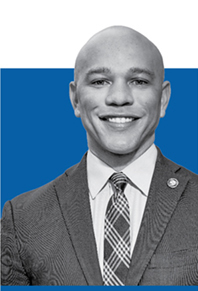
Stephan Davis ’16DNP
“Of all the forms of inequality, injustice in health is the most shocking and the most inhuman.”
Martin Luther King Jr. spoke those words at a 1966 press conference in Chicago. Decades later, they inspired Stephan Davis to commit himself to reducing that injustice. He deliberated between careers in social work or nursing, landed on the latter, and gravitated toward leadership roles. “I wanted to effect change more broadly rather than working with one patient at a time,” he says.
Davis has since directed much of his energy toward concerns of diversity, equity, inclusion, and belonging in health care. His interest in this work was sparked when he learned of a 2002 lawsuit brought against the University of Maryland Medical System, in which a gay man was not allowed to visit his domestic partner—who was dying of complications from AIDS—because they were not legally married.
Now an associate professor and the director of professional doctoral education at Georgetown University, Davis says this era is a com- plicated moment in the DEIB space. A steady note of progress had sounded from about 2007 through 2021. “We were moving on an upward trajectory,” he says. “Over the last several years, there are moments where it has actually felt like we’ve regressed.”
Consider one of his previous positions: chair of diversity, equity, and inclusion at the University of North Texas Health Science Center’s School of Public Health. Texas governor Greg Abbott signed legislation demanding that, by January 2024, public universities eliminate DEI offices, mandatory DEI statements, and training.
But Davis carries on—driven in part by personal motivation. Though Black and gay, he grew up in St. Louis in a “very conservative and traditional household.” He was sent to conversion therapy. Then he moved to New York City, and a world of openness, a world willing to embrace, spread before him. Life didn’t need to be like Missouri. This other world, the world of acceptance, is what he strives to create.
 loading
loading